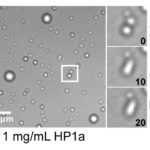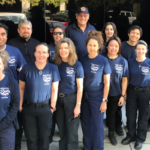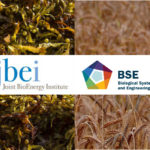In a paper published June 21 in the journal Nature, Berkeley Lab Biological Systems and Engineering Division researchers Amy Strom and Gary Karpen provide evidence that liquid-liquid phase separation in the nucleus of cells plays an important role in how genes are regulated to be silenced or expressed. They observed that heterochromatin—an unusual part of DNA that generally must be silenced for cells to function properly—is sequestered in droplets that fuse together just like two drops of oil surrounded by water. Understanding this mechanism could open up a third of the genome that was previously inaccessible to genome manipulation and gene therapy, Karpen said. Read more in the News Center release.
JBEI’s Vy Ngo Awarded Grace Fimognari Memorial Prize
 Vy Ngo, student assistant with JBEI ’s Feedstocks Division, part of the Biological Systems and Engineering (BSE) Division was awarded the Grace Fimognari Memorial Prize during UC Berkeley’s Molecular & Cell Biology (MCB) 2017 Commencement. The Prize established in 1969 is awarded to outstanding graduating senior in the Biochemistry and Molecular Biology (BMB) emphasis of the MCB major. Ngo was mentored by Jenny Mortimer, JBEI’s Director of Plant Systems Biology, initially through Berkeley Lab’s Community College Internship (CCI) program in 2015 and then completed the Science Undergraduate Laboratory Internship (SULI) program in 2016. She continued to intern at JBEI as she transitioned to UC Berkeley.
Vy Ngo, student assistant with JBEI ’s Feedstocks Division, part of the Biological Systems and Engineering (BSE) Division was awarded the Grace Fimognari Memorial Prize during UC Berkeley’s Molecular & Cell Biology (MCB) 2017 Commencement. The Prize established in 1969 is awarded to outstanding graduating senior in the Biochemistry and Molecular Biology (BMB) emphasis of the MCB major. Ngo was mentored by Jenny Mortimer, JBEI’s Director of Plant Systems Biology, initially through Berkeley Lab’s Community College Internship (CCI) program in 2015 and then completed the Science Undergraduate Laboratory Internship (SULI) program in 2016. She continued to intern at JBEI as she transitioned to UC Berkeley.
Three Biosciences Employees Complete Emergency Medical Technician Basic Training
Three individuals from the Biosciences Area were among a dozen employees to complete Emergency Medical Technician Basic (EMT-B) training to join Berkeley Lab’s volunteer Medical Emergency Response Team (MERT). The training, provided by Protective Services, comprised more than 170 hours of classroom instruction, hands-on demonstrations, ambulance ride-alongs, and testing. Congratulations to Gaby Fuentes-Creollo, Barrier Facility Manager at Biosciences Operations at Berkeley, Christine Ichim, a postdoctoral scholar in Mina Bissell’s lab in Biological Systems & Engineering (BSE), and Hoang N. Pham, a technical affiliate working with Abby Dernburg in BSE.
Thirdhand Smoke Study Gets Renewed Media Attention
Research published earlier this year by Berkeley Lab scientists in Biological Systems and Engineering Division (BSE) showing that exposure to thirdhand smoke was associated with low body weight and immune changes in young mice has recently received a flurry of renewed media attention. Antoine Snijders was interviewed via Skype for a segment that aired on New York’s Fox 5 News. In it, he noted that human infants and toddlers could potentially be at risk of exposure. “They play with toys, they play on carpets, there’s much more hand-to-mouth action than most adults do. So the exposure levels could be significantly higher in that age group,” he said. An article on USAToday.com quoted Bo Hang and Jian-Hua Mao. “We suspected that the young are most vulnerable because of their immature immune systems, but we didn’t have a lot of hard evidence to show that before,” Hang said. The study was also referenced on the blog Bustle which linked to the original Berkeley Lab News Center article.
Papers by JBEI/BSE Researchers Among Journal’s Most Impactful Articles
Two papers by Joint BioEnergy Institute (JBEI) and Biological Systems and Engineering (BSE) researchers are currently ranked among the most popular articles published in the journal BioEnergy Research. “An Investigation on the Economic Feasibility of Macroalgae as a Potential Feedstock for Biorefineries,” published in in 2015, is among the most downloaded, and “Assessment of Lignocellulosic Biomass Using Analytical Spectroscopy: an Evolution to High-Throughput Techniques,” published in 2014, is among the most cited. In the former paper, the authors—Murthy Konda, Seema Singh, Blake Simmons, and the late Daniel Klein-Marchschamer—presented a detailed technoeoconomic analysis of the economic potential and cost drivers of macroalgae as a feedstock for the production of biofuels and biochemicals. In the latter, Jason Lupoi, Singh, and Simmons undertook a comparative review of rapid, high-throughput spectroscopic techniques and standard, more time-intensive techniques to analyze candidate terrestrial biomass feedstocks for desirable traits.
- « Previous Page
- 1
- …
- 38
- 39
- 40
- 41
- 42
- …
- 62
- Next Page »
Was this page useful?







